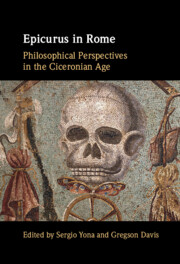Acknowledgements
The late Diskin Clay played a crucial nurturing role in our earliest researches into the reception of Epicurean thought among the major Augustan poets, especially early Vergil, which led to extensive reading of the burgeoning editions of the Philodemus papyri from Herculaneum and to the study of the Diogenes of Oenoanda inscription. The memory of his convivial conversations on all aspects of Epicureanism continues to provide consolation for the loss of his intellectual companionship. Phillip Mitsis and David Konstan, both ex-colleagues at New York University, were no less inspiring in stoking the embers of inquiry into the teachings of the Garden and their prolific afterlife. We are grateful to Duke University for its support of our work by granting a timely leave of absence that greatly facilitated the task of co-editing this volume of essays.
We would also like to acknowledge the support of David Armstrong, whose intellectual generosity and guidance over the past few years have contributed in many ways to the organization of the present volume. The University of Missouri likewise facilitated progress by the granting of a leave of absence for the 2019–2020 academic year.
Additionally, the present state of this collection of studies owes much to the valuable feedback of the anonymous readers, whose suggestions did much to improve the overall quality of the work. Our thanks also to the editorial staff at Cambridge University Press, especially Michael Sharp and Katie Idle, and copy-editor Joshua Hey along with Sindhuja Sethuraman, for overseeing and coordinating everything relating to the publication process.
Finally, we thank every one of our contributors, whose expertise is clearly the focus of this edited volume and whose patient collaboration made the entire endeavour a very enjoyable and memorable one. And, of course, we owe a debt of gratitude to our wonderful families, who, as always, are an indefatigable source of support and encouragement to us in all that we do.

